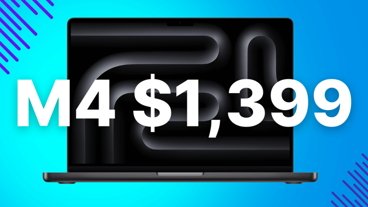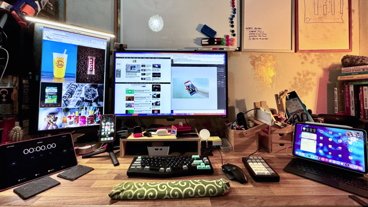Having locked down the iPhone for at least three years, AT&T is now expected to take one more shot at an exclusive deal for the Apple handset and may keep it away from competitors until 2011.
Not surprisingly, there is no word from AT&T on the subject, and an Apple spokeswoman would only say that the two companies have a "great relationship."
The supposedly inside information echoes a report from last year that also said AT&T had struck a deal to keep the iPhone until 2010 and may provide insight into current talks. At the time, the cellular carrier reportedly agreed to allow iPhone 3G subsidies in exchange for a one-year extension of the iPhone's US exclusivity. Although the cost of discounting those phones has been severe — as much as $1.3 billion to date, according to an estimate — the agreement renewed interest in AT&T and gave it millions of users paying at least $60 per month (on grandfathered plans) for service.
Also, the iPhone gives AT&T a way of keeping customers from jumping ship to Verizon or another alternative at a time when the market is saturated and customers are more likely to have switched than sign up for the first time. The company added 1.9 million iPhone users just in the fall 2008 quarter alone and notes that many of these are less likely to give up on service than those who use other phones.
No matter how successful AT&T may be in lengthening its time spent with the iPhone, the firm is likely to maintain an inherent technological basis for holding the device close until two years later. As the only major US carrier with 3G using the HSPA standard on the 850MHz band, the iPhone as-is only supports its service for full data. Adapting the phone to T-Mobile USA would most likely require adding the 1,700MHz band, while switching to Sprint or Verizon would, for now, need a complete overhaul that swaps in CDMA calling and 3G access using EVDO; either of these is expected to gradually phase out.
Eventually, AT&T and Verizon will share the same network format when they both move to 4G using the Long Term Evolution format, but neither expects to have any significant networks until 2010, rendering any truly multi-carrier US iPhone impractical until the possible new expiry date for the agreement between AT&T and Apple.
 Katie Marsal
Katie Marsal






-m.jpg)






 Christine McKee
Christine McKee
 Malcolm Owen
Malcolm Owen

 Sponsored Content
Sponsored Content

 Amber Neely
Amber Neely











147 Comments
Unbelievable. This is wrong. We need to start a movement online to tell Apple we are not happy and this is not acceptable. We need some fair competition.
^^^ I agree. The thing that scares me is the idea of data caps or restrictions on what kinds of data can be transferred- like Skype not being allowed to run on 3g. Also- if the next iPhone does video calling- it would really suck if ATT tries to charge those as separate minutes. We need carrier competition. And come on Apple- won't you make more money?
Unbelievable. This is wrong. We need to start a movement online to tell Apple we are not happy and this is not acceptable. We need some fair competition.
Serious
competition will only come when Verizon switches over to LTE UMTS. Currently, AT&T already does UMTS while Verizon is still using the old EVDO.
It sucks, but like the article says, theres no real way to use it with other carriers anyway. AT&T's network sucks. Verizons is much better but I doubt there will be a CDMA iphone. I'd get it if there was though. I have so many AT&T rollover minutes because I get such poor signal, I have to use skype to make calls when I'm at home.
I don't see a reason not to if they're going to be staying GSM only for the iPhone 3G. the 4G, however, should not have an exclusive deal.